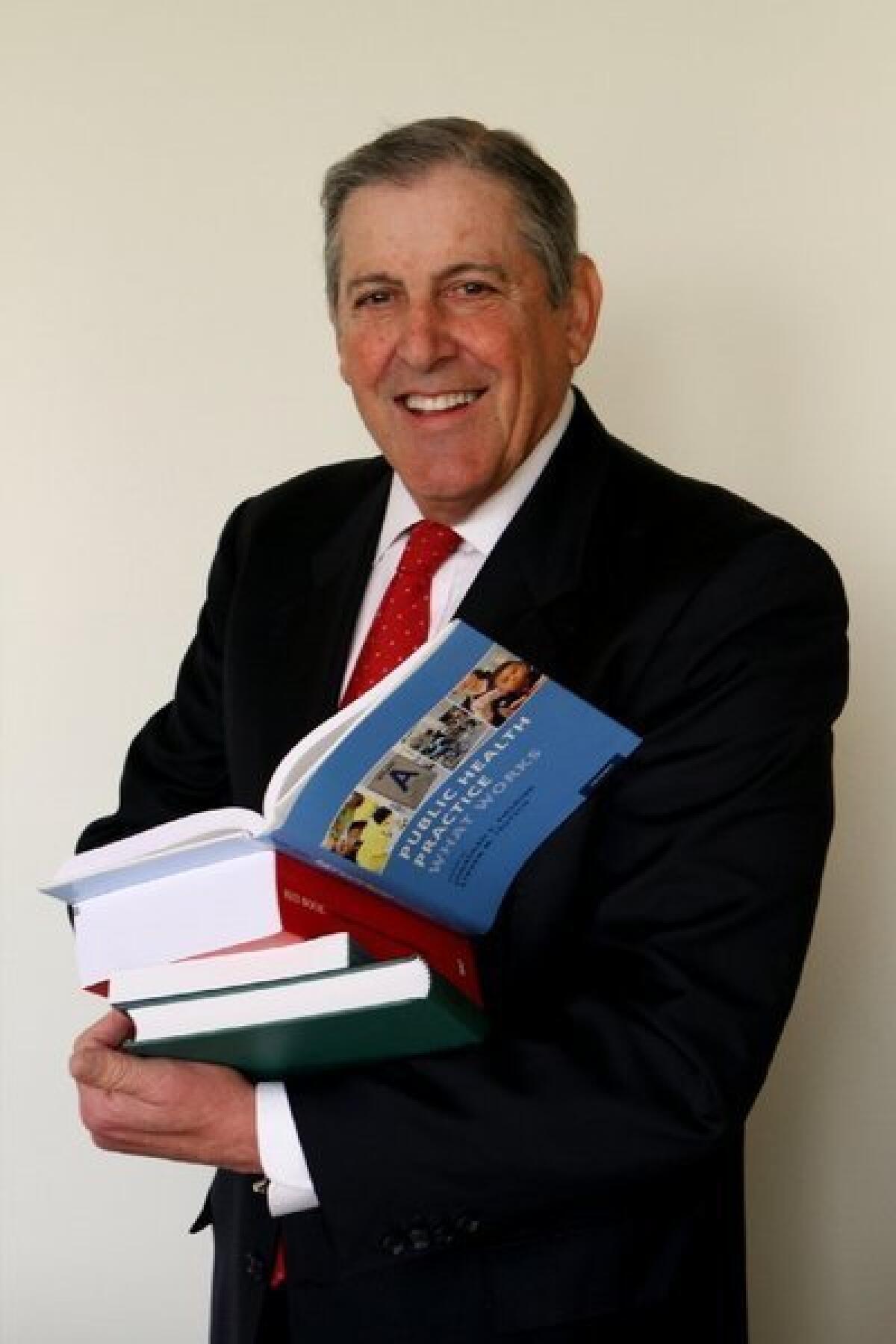Four insights to your health from L.A.’s public MD

- Share via
You think your doctor is too busy? Dr. Jonathan Fielding has about 9 million patients – which is to say, almost everyone in Los Angeles County.
He heads the county’s public health department, a department bigger than that of some states. His is a panoply of responsibilities that don’t pop immediately to mind with the word “health,” from bioterrorism to rules for restaurants that welcome dogs to the perils of sliced fruit sold from unsanitary vending carts.
The department even has its own YouTube channel to get out the message.
Fielding is a pediatrician. His medical training was at Harvard and Georgetown, and his administrative training from the Wharton School. He gave up private pediatrics practice, he said, because “I love to see kids but I also realized that my leverage was not going to be as great seeing them one at a time. It’s hard to give up the satisfaction of taking care of individuals to think about the broader populace, but I decided that that was how I could make a bigger difference.”
I interviewed him for my “Patt Morrison Asks” column, and here he dispenses his thoughts about particulars of public health – your health.
Me: “People think antibiotics are good for anything, including a cold, and we’re developing antibiotic-resistant superbugs.”
JF: “We definitely encounter that. I think it’s consumer demand in many cases: you don’t feel you’ve been treated unless you get your antibiotic prescription, and it’s hard for doctors to say, you don’t really need that. We have a unit that consults with hospitals on this. We are seeing more superbugs; the bugs you can get in hospitals are serious, but if you have to be in a hospital, it’s a good place to be. You just want to make sure you’re not there if you don’t need to be. I think there is an increased focus on trying to reduce the frequency of these infections.”
Me: “What about this craze for antibacterial gel?”
JF: “More hand washing rather than less is good, and certainly [gel is] a substitute, though not a perfect substitute, but it depends on what the germ is and how it’s being transmitted. For a lot of respiratory infections, you’re much likelier to get them being close to someone who’s coughing or sneezing [than by something you’ve touched]. People say, how long should I wash my hands? You go into the men’s room and see people [for whom] three seconds seems a lot. We tell kids you should wash your hands until you can sing ‘Happy Birthday’ twice.”
Me: “Should vitamins and supplements be FDA-tested?”
JF: “The FDA unfortunately does not look at vitamins and minerals and natural supplements for safety and efficacy, which is the standard they use for medications, for drugs. I think they should. I don’t know if there’s the political will to do that.”
Me: “What about people who come to work sick because they don’t want to take their sick days, or they don’t get any?”
JF: “Two separate issues. We tell people in flu season and for other diseases, ‘If you’re sick, don’t go to work. You’re not doing people a favor if you’re going to spread it.’ But many people go to work even though they’re paid for their sick days. They feel an obligation, or they feel it’s not that bad. Increasingly there’s a combination of sick and vacation days put together so they don’t want to diminish their vacation days. Or they’re afraid of being considered a slacker. More problematic are people who aren’t paid [for sick days]. That’s very difficult. What do you do if you’re the only breadwinner and you’re sick, but you don’t get paid if you don’t go to work? It’s terrible. People shouldn’t have to make that choice.”
ALSO:
For dying patients, a prescription of silence
More to Read
A cure for the common opinion
Get thought-provoking perspectives with our weekly newsletter.
You may occasionally receive promotional content from the Los Angeles Times.










